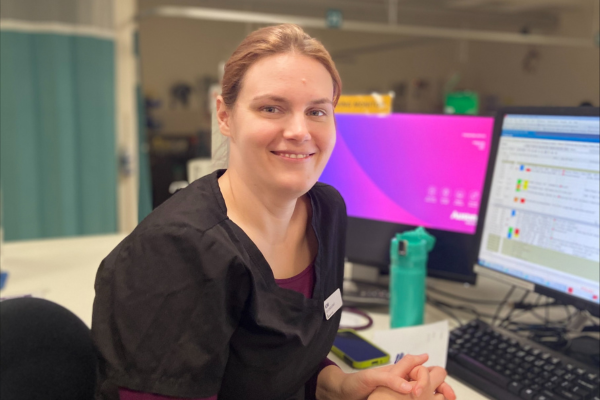About
DonateLife Week: Meet Dr Kim Pollack
- Home
- About
- Latest news
- DonateLife Week: Meet Dr Kim Pollack

28 July 2025
As part of DonateLife Week, we’re shining a light on some of the dedicated staff at Austin Health who support patients and families in making the choice to donate organs and tissue.
Meet Dr Kim Pollack, an Emergency Physician, co-Director of Emergency Medicine Training, and the Emergency Department Liaison to the Austin Tissue and Organ Donation team.
Kim plays a key role in promoting organ and tissue donation conversations in the Emergency Department (ED), working closely with ED clinical champion nurses to educate staff around processes to support patients and families with donation at end of life.
Her passion for this work was sparked after hearing an inspiring talk from Dr Martin Dutch, an Emergency Physician and Medical Donation Specialist.
“He spoke about the role EDs can play in referring patients for consideration of organ and tissue donation, and I thought we could improve this in the Austin ED,” she says.
But her motivation also has a personal dimension.
“A close friend of over 25 years recently received a liver transplant. Seeing the difference it’s made to her quality of life, her ability to return to work, and participate in the things that matter to her – it makes me even more motivated to ensure that all eligible patients and families are given the opportunity to consider organ and tissue donation.”
How the process works
While organ and tissue donation is coordinated by DonateLife Victoria, Austin Health’s clinicians are often the first step in recognising potential donors.
“When a patient is at the end of life and receiving ICU-level care, we refer them to DonateLife for a register check and an assessment of their suitability,” Kim says.
“Families are then approached by the ICU team and a Donation Specialist Nursing Coordinator (DSNC) to discuss donation in a respectful, collaborative way - with the goal of helping them make the right decision for their loved one and for their family.”
Once consent is provided, an extensive coordination process begins.
“Donation involves many departments in the hospital - pathology, radiology, cardiology, nuclear medicine, dermatology, infectious diseases, and more - all working together to determine which organs and tissues are suitable for transplant. Once this is decided and transplant teams have eligible recipients, organ donation surgery proceeds,” Kim says.
From the ED perspective, Kim notes that these conversations with families are not held in isolation.
“We involve the ICU and DonateLife teams so that the conversations happen with the right people who have the appropriate training. Research shows these conversations are best led by ICU teams with a DSNC present.”
Breaking down the myths
Despite increasing awareness, misconceptions about donation persist.
“A common myth is that someone might be too old or have too many medical issues to be a donor,” Kim says.
“However, we’ve seen people well into their 80s successfully donate organs and tissue! It’s important that as clinicians, we don’t rule out the possibility, and always involve DonateLife to help us make the decision.”
The power of registering and having the conversation
Kim’s biggest message during DonateLife Week is the importance of being clear about your wishes, and sharing them with loved ones.
“Registering with the Australian Organ Donor Register gives you a voice about your decision regarding organ and tissue donation when you might not be able to communicate it,” she says.
“We know that around nine out of 10 families say yes to donation when you’re registered, whereas only four out of 10 say yes if they’re unsure about your wishes.”
“Talking to your family about your wishes is just as important as registering - when your family truly understands what is important to you when you die, they can make the right, enduring decisions for you, in line with your wishes.”
This DonateLife Week, take a minute to register as an organ and tissue donor at donatelife.gov.au - and start the conversation with your loved ones.


